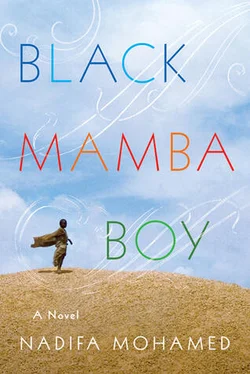Jama felt ashamed. He remembered the story his mother used to tell him about a king who had become insane and was thrown out of his palace to wander the desert, telling insects and scorpions of the sumptuous life he had once lived. Gerset was a different place now. All the men had left to find work as laborers in Kassala, and the women called Jama the eunuch in the harem. He was nothing but a sickly eighteen-year-old with a fluffy mustache, they laughed. Bethlehem was abused for the airs and graces she had assumed as his betrothed, and the only solution she saw to this disparagement was a swift wedding.
Everyday Bethlehem cornered him. “Well, Jama, go and find work so you can pay for my dowry.”
Jama began to fear her, her desperate eyes burning into him, her tongue sharper with each hesitation on his part.
“I should have known you wouldn’t understand anything about how real families work,” she bullied. “Do you understand how you’ve made me look? Chasing after you, working on your accursed farm, I have made a fool of myself, you stupid foreigner.”
In the calm solitude of his tukul, he opened his father’s cardboard suitcase for the first time since leaving Omhajer. The musical instrument he now recognized as a Sudanese rababa, the toy car covered in orange rust that made the tiny wheels squeak against his fingertips, and the other paltry detritus of his father’s life seared his heart. His loss came sharply back to him, and that night he stayed awake in the dark, pinned to the dirt floor by grief for everyone he had lost. Surrounded by his father’s belongings, Jama began to imagine himself as his father’s sole legacy; everything that once had been his father was now contained in him. It was up to him to live the life his father should have lived, to enjoy the sun and rivers, the fruit and honey that life offered. He picked up the rababa and strummed its five strings, imagining the tunes his father had played to his army friends on their long marches. Jama couldn’t put the rababa down, it sat against his thigh and played him, it sang to him and brought back memories that had lain dormant since infancy, his father’s hair, eyelashes, the glint of his teeth all restored to him in startling detail, and he could feel his father’s stubble tickling his breastmilk-fat stomach and the head rush of being held upside down.
Jama’s revelry was broken by Bethlehem pushing her way into the tukul. “What are you doing? You’ve been in here for two days,” she demanded. He had lost all measure of time playing the rababa.
“I’ve brought you some food.” She shoved a dish of sorghum porridge into his hand and then began her lecture. “The women want their farm back, they need the land. You are going to have to find laboring work, Jama. The Italians are back in Tessenei, you know their language, go get a job.”
“They’re not back, it’s the other ones, the British,” Jama said patiently.
“You go ask anyone, the British put the Italians back in charge,” persisted Bethlehem vehemently. Jama stayed silent, unable to believe the news.
After eating, Jama picked up the rababa and played for Bethlehem. “What if I became a troubadour?”
Bethlehem snorted. “Don’t you dare!”
“You don’t think people in other villages would pay to listen to my music?”
“If you want to live a low-class life like that, I can’t stop you, Jama.”
“But you would like to stop me, wouldn’t you?”
“You’re a free man, I know that, I just can’t see why you would want to do such things, but I forget that you have been brought up in the gutter.”
“Shut up!” he snapped. “I don’t know what’s wrong with you, Bethlehem. However good I am to you, you still feel you can wipe your dirty feet on me.”
Bethlehem grabbed her basket and stormed out. Jama could hear her tears but was too angry to pursue her.
Jama carried the rababa with him everywhere he went, penniless but not unhappy. He had no money to pay Awate so the stall in Focka soon became threadbare and dusty, cobwebs hanging like a veil over the hatch. In Tessenei were a group of Tigre youths who spent their day ambling around, singing, drinking honey mead, and watching the world go by. They spied Jama with his rababa and asked him to join them. With a drum and now a rababa, they roamed the villages around Tessenei, busking at weddings and circumcisions. Jama grew his hair long like them, and it fell to his shoulders in wide black curls. They were wild boys who stripped off and jumped into waterfalls, and gorged themselves on the bounty of nature, wild berries, birds they caught with bow and arrow. Awate admired the new rebellious Jama and waited for him after school. Jama would pick him up at Hakim’s shop and heave the ten-year-old onto his shoulders to the villages. During daylight they all sat on the granite boulders by the river and tried to sweet-talk the washergirls away from their fiancés.
“Oh, you are beating my heart against that rock,” called out Sulaiman as he grasped at his heart in front of a giggling girl. As the day ended they were chased away by brothers and fathers.
Jama was carefree for the first time in his life. He had just enough food in his stomach and each day brought adventure and laughter, the boys accepting him the way that only layabouts can, without judgment or demand. His fingertips swelled and hardened as he mastered the rababa, making it whine, holler, and pulsate. Awate danced with his shoulders while the other boys sang and played jokes on the audience.
Bethlehem observed Jama’s new life silently from her hilltop, and brooded over how to reclaim him from the troubadours, but she stomped away from him when he tried to serenade her on the hillside. “Eeesh! I do not speak to vagrants!” she called.
As Jama walked back from the hills to Gerset, Bethlehem’s words followed him. He remembered the rich, dapper-clothed seamen in Aden and looked down at himself, at the dirty white cloth wrapped around him and his beaten-up sandals, and he was suddenly ashamed of his poverty. Jama remembered the certainty with which Shidane spoke about becoming rich. Unlike Jama, his faith in himself had never wavered, and even as a street boy he had thought himself a prince whose kingdom had been temporarily lost.
Inside his tukul, hidden from the dewy night, Jama listened to rain falling on the straw roof. It beat out a rhythm that pulsed all over the village. He prepared himself for another long, lonely night. He lit the last of Bethlehem’s frankincense, its fragrant smoke warming the hut, and stretched out his tired limbs. He was somewhere between sleep and consciousness when in the dim light he saw tendrils shifting and dancing. A man took shape from the arabesques of smoke, extricating himself from the urn like a jinn from a lamp. First his hand appeared, then a thin torso and legs wrapped in ashy robes. He stepped delicately out of the hot coals and approached Jama.
Jama felt a rush of cold blood in his veins as the man touched his face and left a streak of black on his cheek. The man was beautiful, every eyelash, every wrinkle perfectly formed from blue, black, and gray smoke, and within his dark eyes was a pinprick of light, like the lamp of a lighthouse seen through a midnight fog.
“Jama.”
Jama didn’t reply, his tongue lay dead in his mouth.
“Goode, speak to me.”
Jama looked into his father’s eyes, felt the lighthouse beam wash over him.
“Goode, this life is a sliver of light between two great darknesses.” Guure’s voice was raspy, whispers of smoke breaking away from him. “You cannot remain here while your fate awaits you in Egypt. The world has been broken open for you like a ripe pomegranate and you must swallow its seeds.”
“What of my life here?”
Читать дальше
Конец ознакомительного отрывка
Купить книгу












